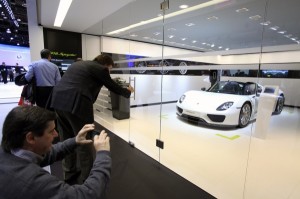Bumi dealers to government: Keep auto APs

By Joseph Sipalan, The Malay Mail
Bumiputera car dealers have asked Putrajaya to help keep their businesses afloat by maintaining the Approved Permit (AP) system, even as the government grapples with growing expectations to liberalise the country’s automotive industry.
The Malaysian Association of Malay Vehicle Importers and Traders (Pekema) said Putrajaya’s continued indecision over the status of the AP system has heightened concerns among its members over how their livelihood would be affected.
“We hope the govenment will continue with the AP system. Maybe review it, but keep it going,” Pekema president Datuk Zainuddin Abd Rahman told The Malay Mail Online when contacted.
When launching the revised National Automotive Policy (NAP) 2014 on Monday, International Trade and Industry Minister Datuk Seri Mustapa Mohamed said that the government has yet to come to a decision on the AP system, which allows permit holders to import cars, saying that a “thorough study” will be conducted after Chinese New Year.
Mustapa later denied that the government was “backtracking” on its decision to halt the AP policy — which is seen as largely benefiting a small section of the Bumiputera community — saying that Putrajaya had found the issue to be more “complicated” than it initially thought.
“We talk to AP people, they also crave employment, participation. We talk to other people, they talk about level playing field,” he said during a question and answer session with the media after unveiling the NAP 2014.
“For the moment, the AP policy remains, which is termination by 2015,” he said earlier.
When the NAP was reviewed in 2009, it was stated that open APs would be terminated by December 31, 2015, while franchise APs would be terminated by December 31, 2020.
Zainuddin said the NAP 2014’s focus on energy efficient vehicles (EEV) is a good move to deal with the rising cost of fossil fuels, but stressed that the government needs to work on reducing excise duties if local players are to remain competitive.
He said that overall car prices will continue to fall in the country, but those in the import business will be hard-pressed to match the lower prices if excise duties remain high.
“At the moment, prices (of imported cars) are a bit high due to the duties. We have asked MoF (Minsitry of FInance) to consider reducing import tax and excise duties.
“For new cars, the import duty is less now, so they should bring dow the used car duties also. The majority of dealers will die if the price remains… what about our cars?” Zainuddin said.
Mustapa had said in the NAP unveiling that the government will not slash excise duties for vehicles as yet, as it accounts for 75 per cent of its total tax collection for vehicles.
He noted, however, that Putrajaya could consider trimming the duties – which have been blamed for high car prices – if the country’s fiscal position is strong enough in the next few years.
The AP system was introduced as an extension of the New Economic Policy, an affirmative action policy that was implemented in 1970 to deal with the income disparity between the majority Malays and the economically strong Chinese community.
Bumiputera dealers hold the lion’s share of APs issued by the government, with open APs typically used to import used cars while franchise APs deal with new vehicles.
Yesterday, PKR lashed out at Putrajaya’s refusal to remove the AP system, saying that the government would not have to backtrack on the scheduled removal of the system if they had done a proper in-depth study beforehand.
”We are also disappointed with the recent flip-flop by BN to maintain the AP system on the excuse that more studies are needed.
”This is no more than an excuse to allow certain groups who are close to BN to gain ridiculous profits when the public continue to be burdened by high car prices,” PKR strategic director Rafizi Ramli and Selangor state assembly deputy Speaker Nik Nazmi Nik Ahmad said in a joint statement.

